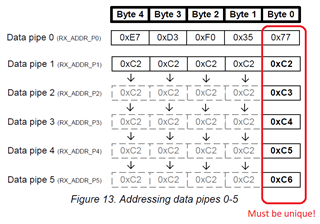Hi,
we found problem with PID, we send individual messages to many nrf24 devices. When we have for example only 2 devices we have losses of around 40-50% but its not a problem with send becaouse on master we never get max transmit. Each time we got confirmation that packet came but we do not have response. on slave devices it looks like its got the message but it treat it like it is repetition of last one. We have in payload 1 byte cnt value so each packetshould be with diffrent crc. In documentation you have information that PID can be the same and than you compare the CRC with last recive packet. In my opinion it is not like that.
Could you tell me if there is any solution for such a behave? It is not just one exapmle we found much more situation (we ask 1 dev which is working and 2 wich is not respond becouse they are not connected to power, 1 work and 6 not work) so there is many configuration that its treate last packet like repetiton. There is any dependency of time. for example if we send packet once per 200ms or one per 5 sec.
It is important for us to resolve this problem becouse we already end developing our system on this because on each building which we will equiped with our system we will use 100-2000 nrf. The efficiency of network should be as good as its possible and with such a problem we can not achive it.
Best regards.
Daniel Bujnowski



